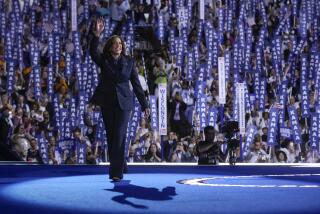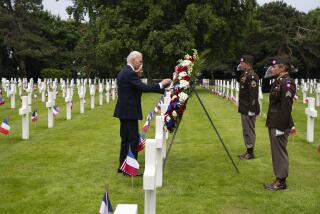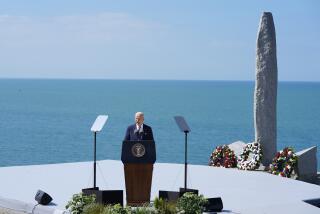Skidding Off the Path of Unity
If you’re on the wrong road, according to the old wheeze, it doesn’t matter whether you know where you’re going.
In seeking the presidency, George Walker Bush promised to lead us toward a more united United States. In the horrible autumn of 2001, he presided over a United States more thoroughly united than at any other moment in my lifetime.
So, look at us now.
Hundreds of thousands of people, hand in hand and children in tow, are taking their anger about war to the streets. You might dismiss some of the leaders of these protesters as fringe thinkers, because they are. But you cannot dismiss the passions they’ve ignited. Beyond that, we should be aware that even at the high-water mark of togetherness, Americans were of sharply mixed minds about many things. As we are learning, that gulf is deeper than it is wide.
Shouldn’t we worry when so many people here and abroad are scared by the president, not just by terrorism?
A few years back I took leave of daily journalism. I went off to write a book about frontier adventure and dog mushing in the interior of Alaska and the Yukon. I wondered what lesson I might bring back with me. Now I know.
When you’re traveling a dangerous trail in a storm, sometimes you need to pause, look around and regain your bearings. Against the numbing bite of the wind and the lashing snow that restricts vision, your instincts tell you to keep pushing onward. Motion seems the only way to achieve progress. You start out resolute; you become merely stubborn. Your blood is up and throbs against your eardrums. You don’t know whether you’ve veered off the path; you cannot hear the ice cracking underfoot.
Millions of people around the world, and a fair share of their leaders, believe Bush has lost his way now.
Protest is not a trivial commitment. The voice of dissent, on the streets and in the diplomatic salons, deprives the president, his country and the other self-governing peoples of what we need most: unity in the face of danger. From a shared sense of purpose, we draw our strength.
You’re either with us or with them, the president said when he declared war upon terrorists.
I applauded his aim, so don’t lump me with the knee-jerk opposition. My opinion carries the weight of only one, but I voiced it in support of the president in Afghanistan in the immediate aftermath of Sept. 11, 2001. Again last fall, I supported his big-stick diplomacy against Iraq. I drew on my experiences abroad as an American journalist who had seen his country and its allies dither indecisively in hotspots like Rwanda, Somalia, Liberia and elsewhere. I believe those halting actions perpetuated misery and served to embolden our foes. I thought Bush’s bluster would drive the world closer to consensus in facing terrorism, tyranny and disorder. For a while it did, and the U.N. now has regained watchdog rights in Baghdad.
I also believe this: The fight against terrorism, fraught with the deepest of religious and cultural resentments, requires broad concordance. The president doesn’t have it for invading Iraq right now. His “coalition of the willing” no longer includes many of his own countrymen, or our old allies.
Those in the armed forces who have been called to fight this war deserve unmitigated support. Our uniformed men and women in the Mideast don’t have it -- not in the way that counts, because they can see the protests on television and listen in on the international deliberations. Take it from someone who wore Marine Corps green in Vietnam -- nothing is so empty as fighting a dubious war.
Can our foes exploit our divisions and the world’s disagreements? I think of the aphorism attributed to Ho Chi Minh in 1969: “You will kill 10 of our men, and we will kill one of yours, and in the end it will be you who tires of it.”
Yes, there are strident voices of anti-Americanism among protest leaders. There are scattershot complainers. There’s far too much wishful thinking from the speakers’ stages about the logic of talking nice and reasoning with those who have sworn our destruction. But the United States was born from protest. And the country has been transformed again and again by the chain reactions of demonstrators in the streets. To dismiss them, as Bush has, is its own form of wishful thinking.
It’s time for a pause on Iraq. Time to regain our bearings. Time to remember that those who counsel patience have to be ready to display it too. Time for a leader to make good on a promise. For so perilous a journey, we should proceed united.
More to Read
Sign up for Essential California
The most important California stories and recommendations in your inbox every morning.
You may occasionally receive promotional content from the Los Angeles Times.










